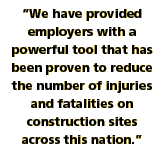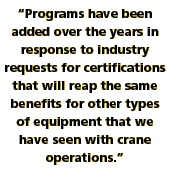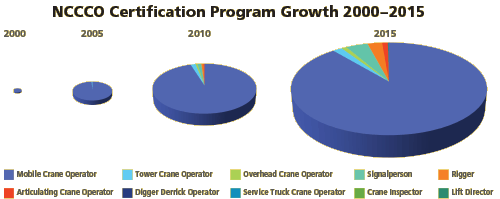May 2016—A remarkable milestone was reached in April with the administration of the 1,000,000th CCO certification examination by the National Commission for the Certification of Crane Operators (NCCCO).
 “The sheer number of written, practical and recertification exams taken by over 250,000 candidates in more than 24 different crane and crane-related exam categories over two decades is a remarkable testimony to the success of CCO certification in establishing itself as an effective mean of evaluating personnel competency,” said NCCCO President Thom Sicklesteel. “And in the process, we have provided employers with a powerful tool that has been proven to reduce the number of injuries and fatalities on construction sites across this nation.”
“The sheer number of written, practical and recertification exams taken by over 250,000 candidates in more than 24 different crane and crane-related exam categories over two decades is a remarkable testimony to the success of CCO certification in establishing itself as an effective mean of evaluating personnel competency,” said NCCCO President Thom Sicklesteel. “And in the process, we have provided employers with a powerful tool that has been proven to reduce the number of injuries and fatalities on construction sites across this nation.”
It was exactly 20 years ago to the month that the first CCO written test was administered, the realization of a dream formed almost a decade earlier in response to rising fatality rates on construction sites across the country.
“Something had to be done,” said NCCCO Vice President Kerry Hulse, “and we – the industry – were convinced we were the most qualified to do it.” Hulse, who served as chairman of the Certification Task Force established by the Specialized Carriers & Rigging Association in 1987 to lead the ground- breaking initiative to develop a nationwide standard for the assessment of crane operator knowledge and skills, says the race was on at that time to prove to OSHA that the industry could take care of itself, if given the opportunity.
“They gave us that opportunity and we ran with it,” he adds, noting that a mere three years after its launch, CCO certification was officially recognized by the very agency (OSHA) that had threatened to develop its own federal program.
 The launch of the NCCCO program, supported from the start (as today) by the industry that continues to benefit from it, set the stage for a remarkable period in which certification emerged from the shadows to take its rightful place center stage in the challenge to mitigate risk on construction sites. “If you could take a pill that would help reduce your chance of a fatal illness by 80%, I think most people would take it,” said NCCCO Chief Executive Officer Graham Brent. “That’s what professionally developed and independently accredited certification has been proven to do for crane operations.”
The launch of the NCCCO program, supported from the start (as today) by the industry that continues to benefit from it, set the stage for a remarkable period in which certification emerged from the shadows to take its rightful place center stage in the challenge to mitigate risk on construction sites. “If you could take a pill that would help reduce your chance of a fatal illness by 80%, I think most people would take it,” said NCCCO Chief Executive Officer Graham Brent. “That’s what professionally developed and independently accredited certification has been proven to do for crane operations.”
Even though in recent years the programs offered by NCCCO have broadened in a manner and at a speed beyond the wildest dreams of NCCCO’s founding fathers, mobile crane operator certification remains at NCCCO’s core.
“Programs have been added over the years in response to industry requests for certifications that will reap the same benefits for other types of equipment that we have seen with crane operations,” said NCCCO President Thom Sicklesteel. “But one thing has never changed: NCCCO’s vision of a safer workplace for all those whose job brings them into contact with cranes. As a non-profit organization that is truly representative of all industry sectors, NCCCO is uniquely qualified for this mission.”

Over the two decades it has been offering certification examinations, NCCCO has expanded CCO certification beyond crane operators to the evaluation of other personnel who also play a significant role in ensuring the safety of lifting operations (size of pie reflects cumulative number of tests taken, by program, at five-year intervals, 2000-2015).